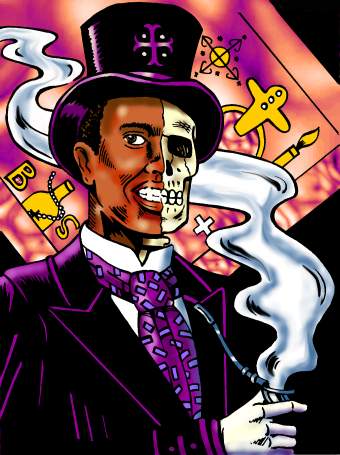Vodou is not limited to Haiti but is practiced worldwide under various names like Obeah, Santeria, and Candomble, each reflecting the rich tapestry of African, Cuban, and Dominican influences. At its core, Vodou involves worship through direct communication with spirits known as loa, with practitioners serving as mediums. These spirits, including Guede, are depicted through symbols and are akin to saints in Christianity, acting as manifestations of God.
The spirit Guede, celebrated in November, is known for its connection to the themes of death and rebirth. Despite its somber associations, Guede is often revered with joy and festivity, reflecting the cycle of life and death that it oversees. Vodou ceremonies, filled with music, dance, and offerings, invite the spirits to interact with the living, often resulting in trance-like states where the loa possess the practitioners.
Vodou’s portrayal in media and history has often been tainted by colonial fears, especially after Haiti’s independence in 1803 when it became associated with rebellion and freedom. This has led to a long-standing campaign to demonize the religion, obscuring its true nature as a complex and deeply spiritual practice.
Understanding Vodou requires recognizing its roots in African spirituality and its profound connections to community and nature. It is a religion of faith, where God is believed to manifest through various loa, each responsible for different aspects of life. Misunderstandings about Vodou persist due to its secrecy and the sacredness of its practices, which are guarded by religious leaders known as Houngans and Mambos.
This series aims to shed light on Vodou, starting with the spirit of Guede, to foster a greater understanding and appreciation of this rich and complex religion. By exploring Vodou’s true practices and beliefs, we hope to dispel myths and highlight its significance in Haitian culture and beyond.

